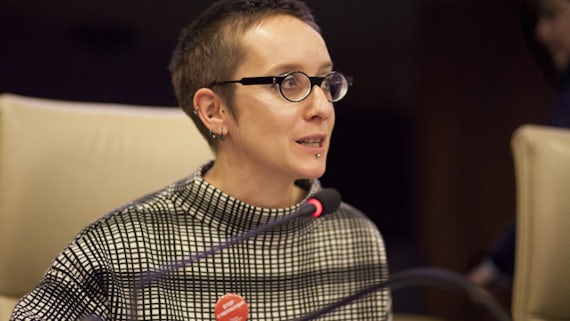Opposition parties accept Welsh Government bill following changes driven by Cardiff academic
13 Mawrth 2015

Research by Professor Emma Renold, School of Social Sciences, was this week credited as one of the catalysts for significant amendments to the Welsh Government's Violence against Women, Domestic Abuse and Sexual Violence bill.
The Violence against Women, Domestic Abuse and Sexual Violence (Wales) Bill was introduced by Lesley Griffiths, Minister for Local Government and Government Business.
In a letter to Jocelyn Davies, Plaid Cymru's spokesperson for women and children, Leighton Andrews, Minister for public services, confirmed that the guidance developed will now include many of the provisions that Professor Renold, the Wales Violence Against Women Action Group and the young people she has worked with have lobbied for.
Professor Renold has given oral and written evidence at each stage of the bill on the importance of placing education, and children and young people's own experiences at the heart of the Bill.
Despite previously being opposed to the bill because of the omission of education proposals, Plaid Cymru, the Liberal Democrats and the Conservatives have changed course and voted in favour now that the Minister has stated that educational provisions will accompany the bill.
Specifically these provisions include education about healthy relationships, violence against women and girls, domestic abuse and gender-based and sexual violence being introduced into schools. The letter also commits to establishing local authority champions to increase awareness of, and change attitudes towards, violence against women and girls, including establishing school-based champions as suggested by the students Professor Renold has worked with.
Following assurances
that these changes would be made opposition parties accepted the Violence
against Women bill, signifying the start of a whole-scale change in the culture
of schools to educate children and young people about tolerance, respect, equality
and healthy relationships.
On hearing of the
amendments and extra educational provisions Professor Renold said: "I am
delighted to see that young people and education are more centrally embedded in
the bill. The students I worked with were extremely passionate about lobbying
for this change so I'm sure they'll be thrilled to have made such a difference.
It's also wonderful to see university-based
research and engagement
projects directly impact upon and influence national policy on such a
scale".
Mr Andrews' letter
continues to confirm that the Wales-based research undertaken by Professor
Renold will be used in drawing up the statutory guidance in its final stages
and commits to a range of activities to promote the programme, including a
Violence against Women national conference and an agenda item on violence
against women at the next national safeguarding meeting.
Professor Renold has
also been invited – along with the
young people she has worked with via the 'Healthy Relationship Matters
campaign' – to the Welsh Women's Aid
conference on Friday 27th March to present on the importance of
putting young people at the heart of whole school approaches. Young people will
also be sharing their successes at the forthcoming Citizens Cymru Brighter
Futures Youth Assembly on Friday 20th March.
She continues: "It's
taken a lot of hard work and determination to get this far. What started with a
cross
party group (on children, sexuality, sexualisation and equality) and some initial
research ideas on how to enable children's voices to be heard, evolved into a
comprehensive piece of participatory research in which children's rights and
child protection came together to understand children's young relationship
cultures. Presenting this research at the Welsh Assembly over the past 12
months has enabled children's own experiences of everyday sexism and sexual
harassment to drive forward the policy agenda.
This is an excellent example of how children should and can be part of
decision-making processes and a landmark achievement for Wales. It's also a
clear example of how universities, policy makers and the third sector can work
successfully together to effect social change. I know that this is just the
beginning of the next stage of the journey but I truly am elated to have
contributed to such ground-breaking change after working in this field for over
15 years".